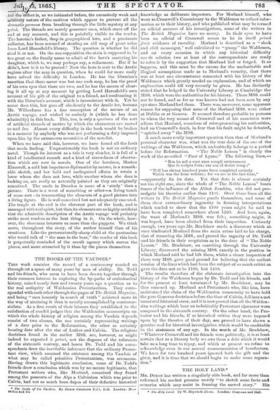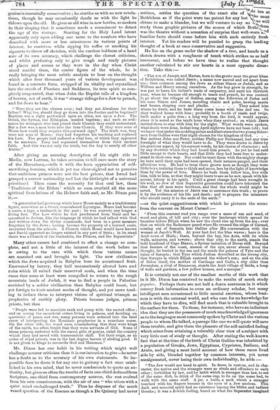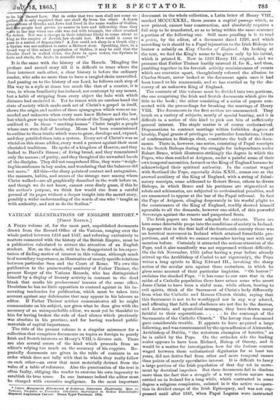THE HOLY LAND.*
Ma. Drxaat has written a singularly able book, and far more than redeemed his modest promise merely " to sketch some facts and sceneries which may assist in framing the sacred story." His • The Zloty Land By W. Hepworth Disou. London: Chapman and Ha. genius is essentially conservative ; he startles us with no new revela- tions, though he may occasionally dazzle us with the light he thiows upon the old. He gives us old wine in new bottles, so modern in their shaping that it sometimes needs a connoisseur to detect the age of the vintage. Starting for the Holy Land intent apparently only upon adding one more to the numbers who have described with more or less minuteness its various points of interest, he contrives while sipping his coffee or smoking his cigarette to throw off sketches, with the careless boldness of a hand sure of its own accuracy, which challenge the closest criticism, and whilst professing only to give rough and ready pictures of places and scenes as they were in the day when Christ stood amidst them, the centre figure of the whole, he is really bringing the most subtle analysis to bear on the thought which after four thousand years of various development was found in a concrete form, stripped of its vitality and crystallized into the creeds of Pharisee and Sadducee, its true spirit so com- pletely evaporated, that when John the Baptist tells of a kingdom of heaven, not of earth, it was " strange tidings for a Jew to preach, and for Jews to hear."
" Were they not the chosen race ; had they not Abraham for their father? Why, too, should they go down into the Jordan and be baptized? Baptism was a right performed upon an alien, not upon a Jew. The Greek, the Syrian, the Ethiopian, needed baptism ; and such an ordi- nance for strangers who had joined their Church they could understand. But a Jew was a man born into the true Church. If they were sons of Moses how could they require this-ontward sign? The truth was, they were not sons of Moses ; they had forgotten his teaching and replaced his Law. The people had suffered a vital loss, of which they appeared
to be unaware. They had separated themselves from their ancient faith. And this was not only the truth, but the key to nearly all other truths."
After giving an amusing description of his night ride to Modin, now Latrum, he takes occasion to tell once more the story of the Maccabees,—tells it with the keen appreciation of self- sacrificing heroism, which is yet too clear-sighted not to perceive that ambitious princes were not the best priests, that Israel had grasped a narrow nationality and lost the birthright of a universal priesthood. Then came the necessity for that oral law, those Traditions of the Elders' which so soon overlaid all the more spiritual foundations of the Hebrew faith and, as Mr. Dixon puts it,—
"A generation had grown up which knew Moses mainly as a traditionary figure, somewhat as a Greek remembered Lycurgus. Moses had become a name, a type, a landmark in the past ; he was scarcely any longer a living fact. The Law which ho had proclaimed from Sinai and be- . queathed to Joshua, like the language in which he had talked with God and written down the divine commands, had been in a great measure forgotten by the Jews ' • having become the property of a learned caste, recruited from the schools. A Church which Moses would have known and David approved no longer existed in any part of Syria ; in its stead there was a Church of the Sanhedrin, the Princes, and the Separatists."
Many other causes had combined to effect a change so com- plete, and not a little of the interest of the work before us is owing to the care with which these various causes are searched out and brought to light. The new civilization which the Jews acquired in Babylon bore its accustomed fruit. Enervated by luxury, they half unconsciously altered laws and rules which ill suited their unnerved souls, and when the time eame that some at least were compelled to return to the rough mountain lands of Judah, it was to find a people in Palestine enriched by a nobler civilization than Babylon could boast, but yet foreign to their ancient modes of thought, and yet more tend- ing to induce them to interpret visions of spiritual triumph as prophecies of earthly glory. Priests became judges, princes priests, but thus
"People were led to associate rank and pomp with the sacred office ; and on seeing the sacerdotal orders living in palaces, and deciding on questions of peace and war, many persons were seduced into the fatal error of interpreting the Messianic prophecies in a mundane sense. On the other side, the royal race, remembering that they were kings of the earth, too often forgot that they were servants of God. Some of these princes, endowed with the rarest gifts of genius, ruled the country which they had saved with transcendent skill. Yet their reign, as an order of royal priests, was in the last degree barren of abiding good. It is not given to kings to reconcile God and Mammon."
Mr. Dixon has one habit in his writing which might well challenge severer criticism than it is our intention to give—he never has a doubt as to the accuracy of his own statements. So im- possible does he deem it for any one to gainsay a fact once estab- lished in his own mind, that he never condescends to quote an au- thority, but gives us often the results of facts one-third deduced from Scripture, one-third from contemporary sources, the rest evolved from his own consciousness, with the air of one " who utters with a quiet mind unchallenged truth." Thus he disposes of the much vexed question of the Essenes as though a De Quincey had never
written, settles the question of the exact
[July 1.±865. site 'lle:rielinnioat he Bethlehem as if the point were too patent for any but ie nst obtuse to make a blunder, but we will venture to say no ';tle will study those graphic pictures of the scenes of which Beth4heill was the theatre without a sensation of surprise that well-worn isir.0 familiar facts should come before him with such entirely fresh interest. Yet his readers will be puzzled to grasp the leading thought of a book at once conservative and suggestive.
He lies on the grass under the shadow of a tree, and hands us a sketch drawn with a roughness of touch which strikes us as half irreverent, and before we have time to realize that thought another calculated to stir our hearts in a most opposite dime- tion. Take this :— "The son of Joseph and Marian, born in the grotto near the great khan of Bethlehem, was called JEsus ; a name now sacred and set apart from use ; then common among the Jews as either Simon or Judah, and as William and Henry among ourselves. As the boy grew in strength, he was put to learn his father's trade of carpentry, and until his thirtieth year, when he became old enough to teach and preach, he was content to go about the villages of Galilee, among the followers of Judas and his sons Simon and James, mending chairs and poles, hewing masts and beams, shaping oars and planks They asked him where he dwelt, and he bade them come home with him and see. So they walked home with him ; probably to a booth of reeds and twigs, built under a palm tree ; a long way from the ford, it would appear, since it is noted as the tenth hour when they arrived ; on which JESUS invited them to stay with him for the night. What words were spoken, what deeds were done, inthat long April nightwe have not been told ; but we know that under thenoddingpalms and silent stars the two young fisher- men from Galilee were that night chosen for the kingdom of God. . . . But neither John nor Peter, neither Philip nor Nathanael, had any true foresight of what they would have to do. They were drawn to Jams by his gracious aspect, by his earnest words, by his charm of character ; not by any doctrine which they had heard him preach. As yet he had said little except to their hearts, and that little they had been free to under- stand in their own way. Nor could he trust them with the mighty charge he bore until their eyes had been opened, their natures purged, and their affections won. He had to treat these grown men as though they were little boys, training them to think and move, less by the light of knowledge than by the power of love. Hence he bade them follow him, live with him, talk to him, so that they might learn to see as he saw, speak with his accent, labour in his spirit. Until a great change h1d been wrought in his soul, no Jew of that Separatist generation could have tolerated the idea that all men were brethren, and that the whole world might be saved. Yet the mission of JESUS was to announce this truth ; to prove it by the evidence of his life and death ; and to prepare the ministers who should carry it to the ends' of the earth."
—or the quietsuggestiveness with which he pictures the scene from the convent on Mount Carmel :—
" From this convent roof you range over a mass of sea and sand, of wood and plain, of hill and city ; over the landscape which spread its beauties before Elijah when he saw the cloud rise up from the sea ; over that on which the Redeemer gazed when He crossed the ridge of Carmel, coming out of Samaria into Galilee after His conversation with the woman at Jacob's Well. At your feet fret the blue waves ; here is the Arab town of Haifa ; there, beyond the bay, lies Acre, with its white walls, minarets, and towers ; above that city, to the north, stands the bold headland of Capo Blanco, a Syrian imitation of Dover cliff. Beyond that feature of the coast, unseen of the eye, never absent from the thought, lie buried in the sea and the sands the palaces of Tyre and the rains of Sarepta ; that Tyre which Joshua described as the strong city, that Sarepta in which Elijah restored the widow's son; and on the site of Sidon itself, the mother of Carthage and Cadiz, a city older than Jerusalem, a rival of Damascus, stands the Arab village of Saida, a heap of walls and gardens, a few yellow house; and a mosque."
It is certainly not one of the smallest merits of this work that in it Mr. Dixon has contrived to make the results of much study popular. Perhaps there are not half a dozen sentences in it which convey fresh information to even an ordinary scholar, but many intelligent men accustomed to little mental exertion, whose busi- ness is with the external world, and who care for no knowledge for which they have to dive, will find much that is valuable brought to the surface for them. To those, for instance, who have an indistinct idea that they are the possessors of much unacknowledged ignorance as to the languages most commonly spoken by Christ and the various people to whom He talked, a passage like one we will quote will save them trouble, and give them the pleasure of the self-satisfied feeling which arises from attaining a tolerably clear view of a subject with very little cost of study or thought. After stating the well-known fact that at the time of the birth of Christ Galilee was inhabited by a population of Greeks, Jews, Egyptians, Cypriotes, Italians, and Arabs, and giving a most lucid account of how these races lived aide by side, blended together by common interests, yet never amalgamated, never losing their own individuality, he adds :— " The Jew would not bend in spirit. In dress, in custom, and in cha- racter, the native and the stranger were as rivals and offenders to each other ; forbidden by law, and by habit which is stronger than law, to eat of the same dish, to drink of the same cup, to lie on the same bed, to walk with the same staff. A jar, a knife, a sack which a stranger touched with his fingers became in the eyes of a Jew unclean. This dark and unsocial spirit had no existence among the blithe and radiant Greeks ; it was a Jewish feeling, based on what the Separatist imagined to be h. Sacred Law. But in order that two men shall not come to- gether is only required that one shall fly from the other. A dozen gene ons of Greeks and Jews had lived in the same wadies of Galilee, and e people had grown no nearer in love and fellowship than they ,2ere in the day when one side was red with triumph, the other crushed -6y. defeat. Nor was a change in their relations likely to come about so long as the empire of Jewish law should last. How could it come to pass in a nation of Separatists ? A Jew could not sleep in a Greek city ; a Syrian was not suffered to enter a Hebrew door. Speaking, then, in a broad way of this mixed population of Galilee, it may be said that the Greeks lived in walled cities, the Jews in open towns, the Syrians in huts and sheds, the Arabs in nomadic tents."
It is the same with the history of the Herods. Mingling the profane and sacred story till it is difficult to trace where the lines intersect each other, a clear history is before the ordinary reader, who asks no more than to have a tangled skein unravelled. And passing on to the history of our Lord, he follows each step of His way in a style at times too much like that of a courier, it is true, in whom familiarity has induced, not contempt by any means, but a habit of stripping from every object the halo with which distance had encircled it. Yet he traces with no careless hand the state of society which made each act of Christ's a gospel in itself, shows the origin and motive of those synagogues which were so un- needed and unknown when every man knew Hebrew and the law, but which grew up in time to be the rivals of the Temple service, and outlived it. In those " meeting-houses" Christ taught a people whose ears were dull of hearing. Moses had been commissioned to outline to them truths which were to grow, develope and, expand, and they petrified them into a system. Every act of Christ's was as vitriol on this stone edifice, every word a protest against their most cherished traditions. He spoke of a kingdom of Heaven, and they looked to David's throne ; of living bread, and they remembered only the manna ; of purity, and they thoughtof the unwashed hands of the disciples. They did not comprehend Him, they were "weigh- ing his sunbeams in hay scales, and wondering that the balances did not move." All this—the sharp points of contact and antagonism, the manners, habits, and scenes of the strange race among whom 'Christ walked—are all graphically described in the work before us, and though we do not know, cannot even dimly guess, if this be the author's purpose, we think few would rise from a careful perusal of its pages without a deeper insight into the sacred story, possibly a wider understanding of the words of one who " taught as with authority, and not as do the Scribes."
































 Previous page
Previous page